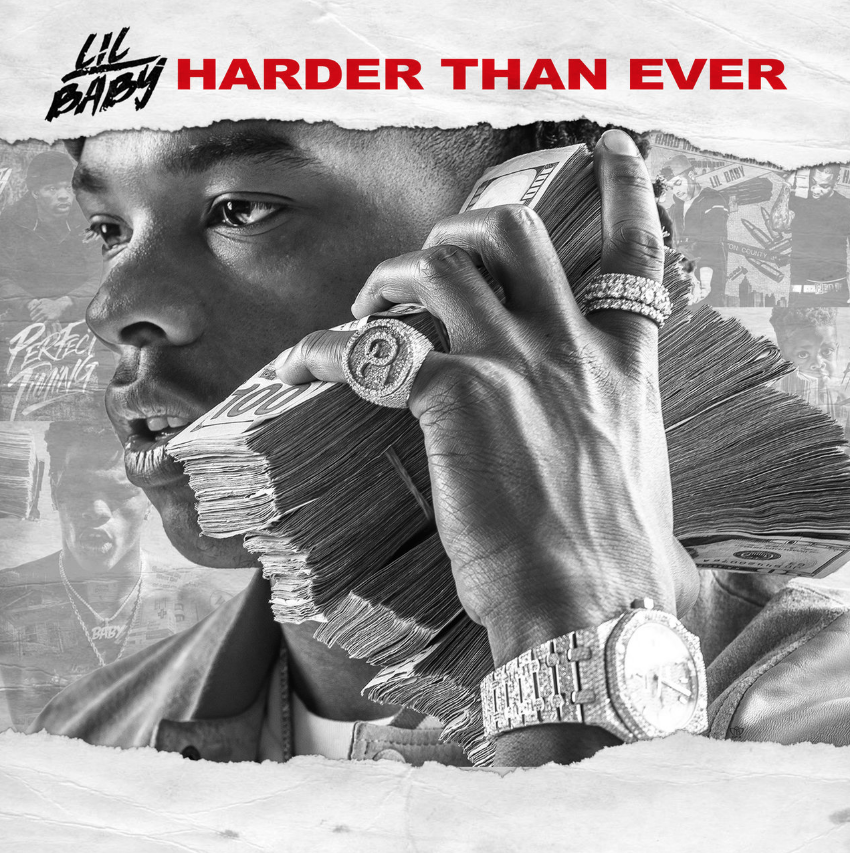Street rap is incredibly genuine—even the glossiest versions are murky, specific, unglamorous, and lacking in pretense. Street rap is working class in both its aesthetic and its goals, the latter of which is being a voice for a community that has none. Atlanta’s Lil Baby has only been rapping for a year, and so his success feels inexplicable until you actually listen to him. His label, Quality Control Music, which shepherded Migos to fame, claims to have taken him from the streets—he’d never before stepped in a booth—and made him a rapper. It sounds like bad mythmaking, as well as the kind of thing that should fail spectacularly. Yet his new full-length Harder Than Ever sounds like the work of an established a veteran. It’s a result so agains the odds that you almost can’t help but be skeptical of at least part of his story.
Lil Baby’s voice has a shaky, strong Southern drawl and he raps, melodically, in vivid detail and with incredible charisma about street life. His passion and feeling drips from his lines with the way his voice quivers and elongates when necessary, forcing the listener to feel the same emotions that he’s pouring out. It actually makes perfect sense that he’s captured attention so quickly.
Lil Baby has seen a steady progression since his first tape Perfect Timing, released just last year. He’s made three more tapes since, including Harder Than Ever, and in each one he’s grown more into his voice, carving out a distinct sound while experimenting with his style in small ways. Harder Than Ever, more than any other tape, is meant to be his big moment, with guest appearances from artists like Drake, Young Thug, Lil Uzi Vert, Starlito, and Offset. For his part, Lil Baby holds his own against any of those guests. Harder Than Ever sees a clear growth in Lil Baby’s skillset, and the tape is actually at its best when he’s alone, steering the songs down his unwieldy subconscious with complete focus and care. “You can play, just proceed with caution / I popped the wrong pill, now I’m nauseous / I need to get off this drank, it’s a problem / I took a Tesla and landed on Mars / Lord please wake me up tomorrow,” he raps with a jagged melody on “Leaked,” evoking melancholy and desire in one fell swoop. “Leakin” in particular is a good example of the best version of Lil Baby, melodically scatterbrained but still engaging. Jumping from lines about making millions and burying it immediately into relationship drama, he raps, “How you gon’ be in your feelings when I’m in my feelings? We both can’t be in our feelings / I ain’t gon’ lie when you thinking I did it, I did it / It’s something about your intuition.” He then brings it all around, ultimately ending the verse saying be saying that “everything gon’ be alright.” You believe him, too—as sporadic and stream of conscious as he can be, he always effectively ties his songs together at the end.
There are songs on the tape that are very clearly aimed to be club bangers and radio hits, like the obvious “Yes Indeed” with Drake and “Life Goes On” with Lil Uzi Vert and Gunna. They’re solid records, especially “Life Goes On,” but they are stifled by their higher aims of being chart toppers. Lil Baby is best without any of those constraints. “If we leave then we fucking tonight, jeans expensive they fitting me tight / I can’t do this the rest of my life, free the bros down the road doing life,” he raps on “Bank,” shifting wildly between topics and attitudes. He continues, “Trying to sleep every night with a knife, know it’s hard but you gotta survive / Man, they got 20 deep on the flight / Going wherever we like, you can go with us too if you like.” These lines are insightful and can be charmingly disorienting on their own, but the fact that they’re only a part of the song’s chorus displays the audacity that makes him so exciting.
Still, Lil Baby’s brand of street rap has the same appeal as artists like Young Dolph, Boosie or Jeezy—fascinating rappers who are good at their craft, but who are adjacent and not necessarily attached to the trends in mainstream rap. It’s a strange sort of counter-conservatism to rap’s current culture, with beats that are steeped in trap production but not as cartoonish as the Soundcloud rap scene, while also not being as pristinely Hollywood as our traditional notions of mainstream rap. The controversial NBA Youngboy has shot to fame primarily in this lane, and there’s no reason to think that Lil Baby isn’t just as capable of reaching those highs. On the tape’s final song “Never Needed No Help” Lil Baby raps, “I run Atlanta, I should be the mayor.” He’s puffing himself up, but Harder Than Ever makes a strong case for that attitude.





